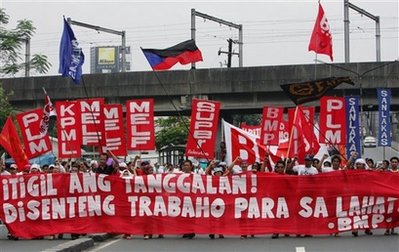PRESS RELEASE
2 October 2015
Workers’ group slams PH govt’s climate change pledge as ‘empty promise’ and ‘hollow threat,’ demands that it ‘walks out’ from bad deal in Paris
The Bukluran ng Manggagawang Pilipino (Solidarity of Filipino Workers), a labor center composed of various unions and trade federations in the country, today strongly criticized the “intended nationally determined contribution” (INDC) that the Philippine government has submitted to the UN as part of efforts to reach a new climate agreement in Paris this December 2010.
Calling the said INDC as an “empty promise” and a “hollow threat” that primarily promotes the interests of Filipino elites, the workers’ group says the Philippine government is effectively condemning millions of Filipino workers to suffer from climate change by not effectively standing up for their interests in the international arena.
The Philippine government is “pledging" to reduce emissions by 70% by 2030 but is making this conditional on finance, technology, and resource transfers from developed countries.
“The so-called ‘intention’ to reduce emissions is an empty promise, if not an outright lie, because the government, as presently constituted, has no intention of immediately and unconditionally scrapping its plans to build more coal power plants in the country, to democratize control over the energy sector, and to steer the country away from the ‘profit-over-nature’ development model,” the group said.
While the labor group agreed with the demand that developed-country governments should provide more resources to developing country-governments, it scored the government’s persistent attempts to instrumentalize this demand to shield local ruling elites from owning up to and paying for their own “climate debts” to the Filipino people and to other people suffering from climate change in other countries.
“Making the ‘pledge’ to reduce emissions conditional on the transfer of resources by developed countries,” the group said, “is a way for our country’s elites and their foreign partners—those who profit from dirty energy and from the broader capitalist system which causes climate change—to justify building more coal power plants and more ecologically-destructive practices in the Philippines, and thus avoid their own ‘historical’ responsibility’ for causing climate change.”
“If the government really represents the interests of the Filipino working classes, then it should not only demand that developed-country governments do their fair share in fighting climate change,” the group said, “it should also ensure that our own elites also do their ‘fair share’ in fighting climate change. And that entails, among others, immediately ending coal-power, mining, deforestation, and other destructive projects, de-privatizing and democratising the entire power sector, and scrapping all policies that put the interests of local and foreign corporations over the interests of people and the well-being of Mother Earth."
“And if the government is really sincere in its claim to be standing up to rich countries in the UN process, then it should now be threatening—and preparing—to walk away from what is likely going to be another bad new climate change agreement in Paris.”
“For the past twenty years now,” the group said, “the government has been claiming to be standing up to developing countries. But in fact, at the end of each negotiating session, the Philippines has always meekly and quietly accepted—instead of really fighting against—the unjust agreements that are condemning millions of Filipinos to suffer from climate change. It will make a lot of good rhetorical pronouncements but always bow down to the wishes of the US and other powerful countries when the chips are down. The result is that the Philippines—and other similar developing countries—actually wield no negotiating leverage because the other powerful countries know that they will always surrender in the end.”
“If the government really represents the interests of the Filipino people,” the group stressed, “then it should back its lofty rhetoric by actually threatening to walk out from a bad deal and putting real pressure on developed country-elites—and on Filipino elites--to repay their ecological debts." #




